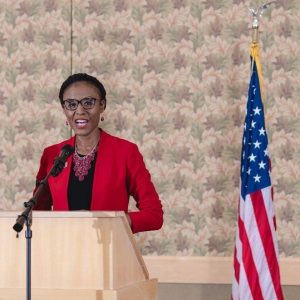My name is Tiffany Carter, and I am a proud, black, federal learning leader. 
When I conduct the business of helping the next generation of federal leaders set the foundation for higher levels of success in their careers and lives, two important streams of thought course through me:
- Gratitude for the rainbow coalition of colleagues, supervisors, mentors, coaches and friends that have poured the best of themselves into me and deeply enriched my own personal, American journey of “Becoming”
- Reverence for the work that I feel so blessed and privileged to do – work that, at one time in American history, due to anti-literacy laws, would’ve been considered a crime punishable by law
Undergirding this gratitude and reverence lies a deep sense of respect for and pride in the legacy of public service that I inherited from my parents. One served in the Student Non-Violent Coordinating Committee (SNCC) while attending a historically black college before beginning her federal career. The other, an Air Force retiree who would later integrate the Northwest Mountain Region of the Federal Aviation Administration (FAA) as an air traffic controller. 
When I consider all that they did to model the level of focus, discipline, grace under pressure, poise, commitment to excellence, and dedication to serving the greater good needed to thrive in the federal workspace, I know with certainty that I would not be the woman I am today had it not been for their prayers, hard work, support and love.
Like many leaders, my journey has not been spared of adversities, crushing heartbreak, and times that just confused me and did not make sense. As I reflect on recent instances of injustice and social unrest in our beloved country, I cannot help but consider one pivotal part of my journey that, frankly, I’d rather forget – the part that involved “the talk.”
What is “the talk,” you ask? It is the unfortunate-yet-necessary dialogue that serves as a staple in many professional, black American households. While we, the children, are busy thinking about the cool clothes we’ll wear and the friends we’ll make at school, our parents settle us down and sober us up from our childhood reverie with the following words:
“Now remember…you’ll have to work twice as hard and be twice as good as everyone else just to be considered equal!”
That’s right. Although we may never personally experience the level of violence we’ve seen in recent weeks, our parents know that when they send us out into the world, away from their watchful eyes and loving embraces, they have to do their due diligence to prepare us. They prepare us for incidents where, at times, our intellectual capacity, our ability to control our behavior, and our overall worth and value might still be questioned – sometimes in a hostile and menacing fashion.
Sadly, this was the case during my formative years. As the survivor of racially-motivated microaggressions and incidents that, at times, made me question my innate value, “the talk” initially helped me show energy to block out the pain, pick myself up, dust myself off and carry on.
But now, with my 40-something years of wisdom in tow, I am keenly aware of one cold, hard truth…
The energy I got from the “the talk” was simply not sustainable.
Here’s why:
1. “The talk” set me up for a life of never-ending “perfectionism.” Defined by Brene Brown as “a self-destructive and addictive belief system” rooted in performing the illusion of perfection in order to avoid shame, “the talk” had me on the hamster wheel of living solely to defy negative perceptions – all in the name of respectability and just being considered good enough.
2. “The talk” made me afraid of failure. Although humbling and often hard to swallow, failure teaches you some of the most important life lessons: Who you are at your core, who you could be if you dare to persist, and who you were, ultimately, never meant to be (despite what others might think). Because of “the talk,” my fear of failure had me stuck, stagnant and unclear about my purpose.
3. “The talk” made me armor up and avoid dealing with the pain of my youth. When you’re busy accomplishing and making the outside of your life look good, you never have time to deal with your pain. As a result of “the talk,” my armor and my I’ll-show-you energy kept pain out for awhile. But it also kept a lot of goodness and support from coming in, too.
4. “The talk” is steeped in an ugly lie. Rooted in the dangerous notion that the worth of a black person can only be measured by how much they labor. “The talk” had me thinking that I am only valuable when I am over-working, competing with others, laboring and proving myself.
In my journey to becoming a competent, compassionate, fully-present, passionate, black federal learning leader, my most-important work has centered around healing my soul and dislodging myself from the notions of “the talk.” For me, healing has taken on a variety of forms: learning to be more vulnerable with the people I serve and serve with, embracing sacred self-care and resilience practices, owning my imperfections and choosing to see them as gifts, allowing failure to teach me and push me into my destiny, embracing the wisdom of those who have come before me, seeking professional help and guidance for the things I still can’t quite process and, ultimately, learning to love the skin I’m in – with no shame in my game.
As I watch the winds of change continue to sweep over our nation, my prayer is that we all commit to the work of healing the collective wounds caused by systemic racism and, one day, reach a time where no other black American family will ever have to give their child “the talk.”
Ms. Carter currently serves as the Program Manager of the Defense Civilian Emerging Leader Program (DCELP) – the department’s enterprise leader development program that provides the next generation of entry-level and emerging civilian leaders from GS grades 7-12 the “power skills” needed to thrive in today’s government. As an Executive and Leadership Coach, Tiffany works with a commitment to helping people clarify their purpose, expand their vision and overcome challenges to create brighter, healthier futures for themselves and the organizations they serve.





Wow, this statement is so true, “survivor of racially-motivated microaggressions and incidents that, at times, made me question my innate value.” I think this would be a great topic for another one of your posts. Thank you for so eloquently describing the challenges faced by Black federal leaders and how we use the power of our family and community. Left unsaid is the support of our spiritual community to help address these issues as well.